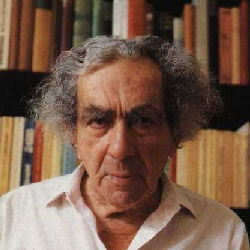 Gyorgy Faludy, the Hungarian poet who lived through years of censorship and exile from his native country, died Friday night at his home in Budapest. He was 95, and had spent decades of his life living outside Hungary, the country that he always thought of as “home”. Faludy was born in 1910, and published his first works, translations of the French poet, Francois Villon, at 27. Those translations were hailed as brilliant – and were regarded by many as being more his own work than that of Villon. In 1938, he published a volume of his own poetry to excellent reviews. Shortly after his book”s publication, the poet fled Hungary to escape the war that was brewing. In 1941, he accepted the invitation that Franklin Delano Roosevelt extended to a small group of Hungarian intellectuals, and came to the United States. He served in the U.S. Army, but when the war was over, he was drawn to return to Hungary. In a 1945 letter written while he was living in New York City, Faludy wrote: “A Hungarian poet, why should he live in America?”
Gyorgy Faludy, the Hungarian poet who lived through years of censorship and exile from his native country, died Friday night at his home in Budapest. He was 95, and had spent decades of his life living outside Hungary, the country that he always thought of as “home”. Faludy was born in 1910, and published his first works, translations of the French poet, Francois Villon, at 27. Those translations were hailed as brilliant – and were regarded by many as being more his own work than that of Villon. In 1938, he published a volume of his own poetry to excellent reviews. Shortly after his book”s publication, the poet fled Hungary to escape the war that was brewing. In 1941, he accepted the invitation that Franklin Delano Roosevelt extended to a small group of Hungarian intellectuals, and came to the United States. He served in the U.S. Army, but when the war was over, he was drawn to return to Hungary. In a 1945 letter written while he was living in New York City, Faludy wrote: “A Hungarian poet, why should he live in America?”
Faludy published another volume of poetry in 1947, but was imprisoned in 1950 as a spy and traitor. He was released from prison upon the death of Stalin – but was still not allowed to publish his own poetry. Faludy fled Hungary again in the wake of a failed revolution in 1956, and lived in exile for the next 33 years. During his exile, he wrote about his prison experiences, his beloved Hungary and his life in exile. He lived most of those years in Toronto, and held Canadian citizenship. He expected that he would never see his native land again, but when the Communist government collapsed in 1989, Faludy returned home to Budapest, where he was lauded and given Hungary”s highest prize for a poet – the Kossuth Prize.
Faludy had harsh criticism for the state of the literary arts in the 20th and 21st centuries.




You must register to comment. Log in or Register.